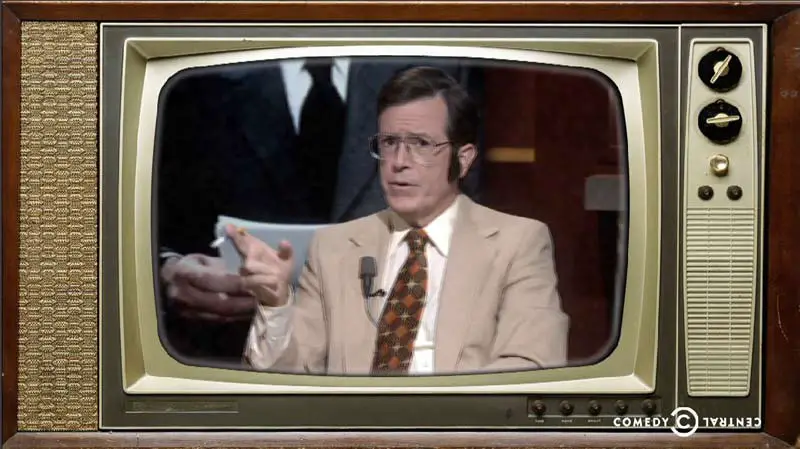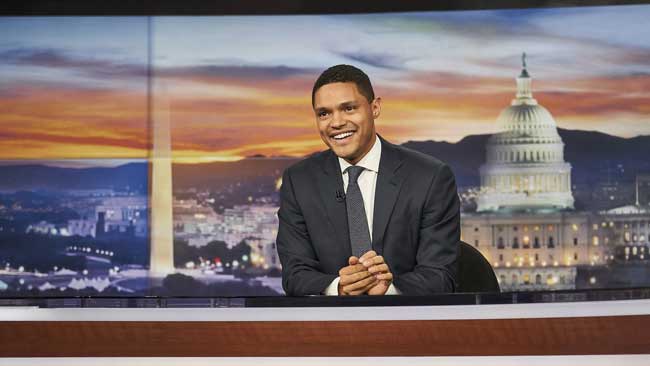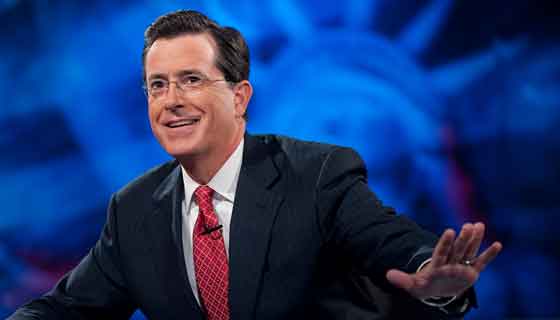Stephen Colbert spoke to two former Nixon White House officials during the week of the 40th anniversary of President Richard Nixon’s resignation from office following the Watergate break-in and subsequent cover-up. Pat Buchanan, a former Nixon speech writer and now a political commentator, has gone on to run for president himself twice as an arch-conservative, challenging former President George H. W. Bush and running again in 2000. John Dean was the chief legal counsel to the president in the Nixon White House. Dean pleaded guilty to a felony in exchange for becoming a witness for the prosecution.
Colbert — who is dressed in a 70s-era suit with mutton chops, a mustache, and chain smoking a cigarette — asks Pat Buchanan why Nixon didn’t just erase the tapes. Buchanan tells him that he advised the president to destroy the tapes that were relevant to the Watergate investigation. The former Nixon speech writer notes that there was a short period of time when Nixon was warned
“He was indecisive in Watergate, I think,” Buchanan says in the interview. “He was too loyal to his friends and he didn’t act. If he had, I think he would have gone down in history as one of the great presidents.”
Buchanan goes on to list a number of Nixon’s accomplishments: the creation of the EPA, a detente with the Soviet Union, ending the Vietnam War, and opening relations with China. “It was an extraordinary success but Watergate erased it all.”
Colbert then asked if Nixon should have destroyed the tapes.
“Certainly. He should never have made the tapes,” Buchanan responded with Colbert interrupting to point out that there was a difference between agreeing that the tapes should be destroyed and thinking that they should never have been made.
“That’s like saying, ‘okay, uh, should you have destroyed the murder weapon?’ Uh, well, better not to murder someone,” Colbert retorted.
“No, no. Here’s where you’re dead wrong. When the tapes were revealed, not a single one of them had been subpoenaed. They were not evidence of anything.”
Former White House Counsel John Dean had a different take.
“I don’t think [the tapes] should have been destroyed. It clearly would have been obstruction of justice.”
Dean went on to explain his plea bargain with the FBI and his explanation to his colleagues at the Nixon White House.
“I’m not going to lie for anybody. I’m going to go to the prosecutors.”
Colbert then asked why Nixon didn’t turn on his inner circle.
“He should have. Should have done that. No question,” Dean said.
Dean claims that Nixon never gave the orders to break into the Watergate Hotel. Other White House aides dispute Nixon’s claim of ignorance on the break-in. Dean, however, corroborates another planned break-in at the Brookings Institute.
While we may never definitively know if Nixon ordered the Watergate break-in, we do have recordings of him ordering a break-in at the Brookings Institute, a centrist think tank:
Chief of Staff H. R. Haldeman: “You could blackmail Johnson on this stuff, and it might be worth doing.”
President Nixon: “How?”
Haldeman: “The bombing halt stuff is all in the same file. Huston swears to God there’s a file on it at Brookings.”
Nixon: “Bob, now you remember Huston’s plan? Implement it.”
*Aides Object*
Nixon: “I mean, I want it implemented on a thievery basis. Goddamn it, get in and get those files. Blow the safe and get it.”
As Salon explains, Tom Charles Huston was an “author of the secret Huston Plan to expand government break-ins, wiretaps, and mail opening in the name of fighting domestic terror, [who] claimed Brookings had a top secret report on the bombing halt, written under the direction of some of the same people who oversaw the Pentagon Papers project.”
Nixon and his aides wanted to tar former president LBJ, who they suspected had engineered peace negotiations with the North Vietnamese to sink Nixon’s campaign in the midst of the 1968 presidential campaign. New tapes have instead revealed that it was Nixon who was politically engineering events, sabotaging LBJ’s peace talks in 1968 out of fear that an end to the Vietnam War would be politically ruinous. As the BBC reported just last year:
In late October 1968 there were major concessions from Hanoi which promised to allow meaningful talks to get underway in Paris – concessions that would justify Johnson calling for a complete bombing halt of North Vietnam. This was exactly what Nixon feared.
The US delegation, left, and North Vietnamese delegation at Paris peace talks The Paris peace talks may have ended years earlier, if it had not been for Nixon’s subterfuge.[Senior Nixon campaign adviser Anna] Chennault was despatched to the South Vietnamese embassy with a clear message: the South Vietnamese government should withdraw from the talks, refuse to deal with Johnson, and if Nixon was elected, they would get a much better deal.
So on the eve of his planned announcement of a halt to the bombing, Johnson learned the South Vietnamese were pulling out.
He was also told why. The FBI had bugged the ambassador’s phone and a transcripts of Anna Chennault’s calls were sent to the White House. In one conversation she tells the ambassador to “just hang on through election”.
Johnson was livid, telling one senator, that “we have found that our friend, the Republican nominee, our California friend, has been playing on the outskirts with our enemies and our friends both, he has been doing it through rather subterranean sources. Mrs Chennault is warning the South Vietnamese not to get pulled into this Johnson move.”
LBJ considered exposing Nixon’s duplicity to the public, ultimately deciding against it because doing so would reveal that the American government was eavesdropping on the South Vietnamese ambassador. While Hubert Humphrey, the Democratic nominee, was informed of the act that amounted to treason, he too held off. Seeing poll data showing him on a path to victory, he decided not to split the country with the explosive charges.
As the BBC notes, “Nixon ended his campaign by suggesting the administration war policy was in shambles. They couldn’t even get the South Vietnamese to the negotiating table.” He would go on to get elected president with a less than 1 percent popular vote victory over Humphrey.
————










